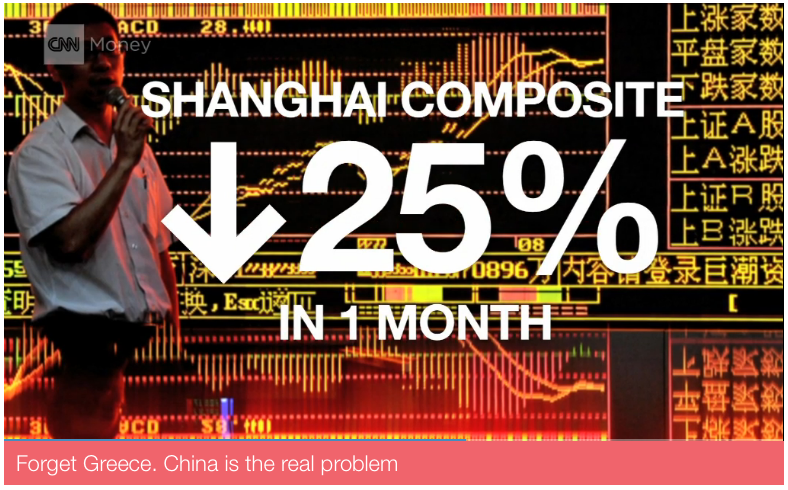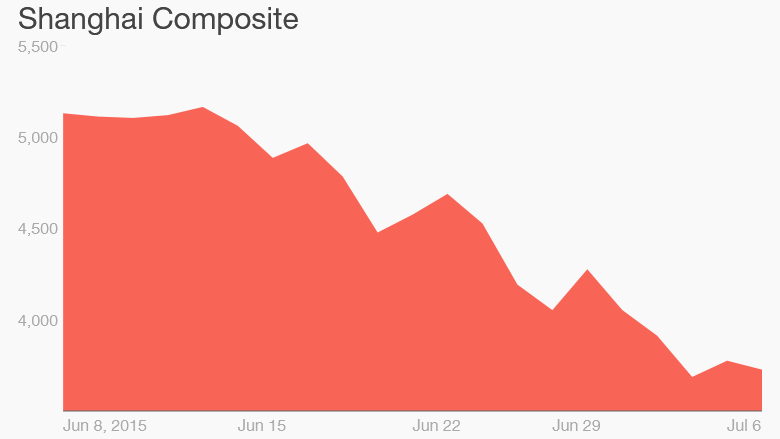China stocks hammered as market crash continues
CNN Money
The population of Greece is slightly less than the state of Ohio’s, while its gross domestic product is just a little bit bigger than the economies of Kazakhstan, Algeria and Qatar.
Instead of focusing on Athens, investors should be much more worried about what’s going on in China. You know, that country with about 1.4 billion people and the world’s second largest GDP?
The Shanghai Composite and Shenzhen Composite have both plunged about 30% from their highs due to legitimate concerns that Chinese stocks are in a bubble.
China’s government is taking steps to try and minimize any more pain in the market. But that could backfire.
Related: China stocks volatile after Beijing acts to avoid crash
Regulators announced Sunday that they would make more capital available for an entity that will allow for even more margin lending, the practice of borrowing money to buy stocks. Buying on margin is incredibly risky.
Many experts believe the Chinese stock market’s surge earlier this year was partly due to average investors taking on debt to invest in stocks.
And when stocks first started to fall last month, many of those investors had to quickly sell their investments to pay back the loans. That fueled an even bigger drop in stock prices.
It could get worse as investors realize that the slowdown in China’s economy should hurt corporate profits.
“Exuberance for Chinese stocks isn’t backed up by fundamentals,” said Michael Pento, president and founder of Pento Portfolio Strategies, in a report Monday morning. “Instead, it appears markets are being levitated by continued government borrowings and manipulations.”
A move by big Chinese brokerage firms to keep buying stocks until the Shanghai Composite reaches a certain value could also be a problem.
Lei Mao, an assistant professor of finance at the Warwick Business School in the United Kingdom, worries that the government may be inflating the value of larger companies at the expense of many smaller firms.
To that end, the Shanghai Composite, which is home to many larger, established Chinese companies, did rise more than 2% Monday. But the Shenzhen, which is where younger, riskier tech stocks tend to trade, fell nearly 3%.
“These distortions, in today’s market, create a significant flow of funds to large state-owned companies – a ‘flight to state’. Plus they might create the reasons for another free-fall in the near future,” Mao said.
Related: Why China’s crazy stock market is getting scary
Why does this matter to people outside of China? A rapidly sinking stock market is often a sign of an economy in turmoil. Remember 2008? And 2000?
Since China is the second largest trading partner for both Europe and the United States, it goes without saying that a healthy Chinese economy is good news for the developed world.
All that talk about the possibility of Greek contagion if it is forced to drop the euro and bring back the drachma? That seems overdone too.
Economists at the Royal Bank of Scotland tweeted out a chart last week that showed that U.S. banks have nearly ten times as much exposure to China than Greece.
And Kathleen Brooks, a research director for FOREX.com, wrote in a report Monday that “sentiment could suffer across the Asia region and further afield” if China is unable to stop the bleeding in its stock market.
Related: China spends billions to try and prop up market
China is a massive consumer of commodities as well.
Oil prices dropped Monday — and while many were quick to blame Greece and the drop in the euro, that doesn’t make that much sense when you think about it.
“Look at the stories written about the drop in the price of oil today, and they’ll be talking about how the demand for oil drops because of Greece,” said Chuck Butler, managing director of EverBank Global Markets, in a report Monday. “I have to think that’s a bunch of bunk. China? Yes. Greece demand? No!”
Of course, you can’t ignore Greece entirely. But don’t get too caught up with the latest headlines from Europe either. China matters a lot more to the global economy — and your portfolio.
CNNMoney’s Heather Long, Alanna Petroff and Charles Riley contributed to this report.

